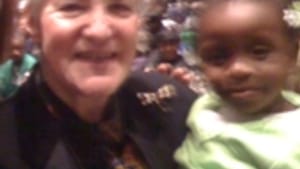Stay in the Loop
BSR publishes on a weekly schedule, with an email newsletter every Wednesday and Thursday morning. There’s no paywall, and subscribing is always free.
Another dead baby, and a way out
An open letter to Mayor Nutter

Dear Mayor Nutter,
I have written to you before about the children who die in the care of our city. I know that children in a city as complex as Philadelphia will suffer illness and poor care, and some will die. But it doesn't have to be this bad.
The case of another starved baby— after a caseworker described four-pound Quisir Alexander (nearly a pound less than his birth weight), as "healthy and well"— propels me to write again.
Some background: As a social worker and family therapist during the '70s and '80s, I wrote a human relationships column in the Inquirer. The theme of many of these columns was a fact of life known to all therapists: Abused children often grow up to be abusive parents, and their children often repeat this cycle of violence in society at large. As a result of those columns, some very desperate people called my office, and I saw them and their families pro bono.
After Lynne Abraham became Philadelphia's district attorney in 1991, she asked me to lunch and invited me to become a pro bono consultant. I was to work with selected first-time offenders in situations involving dangerous family neglect and non-fatal violence, when the neglect and violence was clearly a cry for help. In these cases, Lynne perceived, the city as well as the offenders and their families would be better served through psychotherapy than expensive, time-consuming incarceration. Other city agencies heard of my approach and I was referred other clients to work with.
At the same time, I wrote about my approach in a group therapy journal and attended school conferences and court hearings "“ doing everything I could do to help the families I was working with find hope, confidence and a future.
In this kind of work it's essential to do all you can in a professional capacity to compensate for the deprivation that all abusive parents endure during their formative years "“ to replace these pockets of empty rage and hopelessness with the knowledge that they are worthy of love and kindness.
An offer, and the city's response
Though I continue with my regular private practice, I no longer have the energy to accept these pro bono referrals. After the death last year of little Danieal Kelly— beaten by her parents and overlooked in a city case worker's overload— I wrote and asked you if I could train and supervise a few interested caseworkers in a treatment approach that has proven successful for my clients.
My letters were forwarded to the city's contracting agency, the Department of Behavior Health, and I spent hours preparing a presentation for them. The first time I got on their agenda, I was not called on to present. After I wrote more letters and made phone calls, I was put on the agenda again.
One point that I made in my presentation was that even highly trained professionals get overwhelmed with the kind of work we do. Sometimes workers get so overwhelmed that they falsify records. What you see in the families you work with are parents who have been "parented" by malignant combinations of rage, neglect and abandonment, and children screaming in every way they know for love and connection and, more often than not, not getting it. Your guts feel ripped out, and yet you are expected to offer hope and direction. For this to happen, in-depth training and constant professional support is essential.
But the agency's director wasn't even present to hear my presentation. In due course my pro bono offer was rejected without much in the way of explanation.
Who's to blame?
I suspect that my proposal to contribute was rejected for many reasons. For one thing, I wasn't part of a group that was accustomed to working together. For another, I was proposing a very different and time-consuming clinical approach (where a worker must be available to clients 24/7). Perhaps the blame lies with plain old bureaucratic inertia— the lack of the sort of creative imagination that Lynne Abraham demonstrated. Whatever the reasons, the crying problem remains: Our city needs to train and support the most committed social workers— people who know how to "walk the walk" with Philadelphia's most desperate population.
Please, Mr. Mayor, offer a higher quality training and understanding to those social workers and other health care professionals who perform this important service. And also, offer them more opportunities to process the exhaustion they inevitably feel from their work.
If these and similar common-sense recommendations are not followed, more children will be dangerously imperiled. And their homes, overwhelmed with rage and hopelessness, will continue to produce the monsters in our midst.♦
To read responses, click here.
I have written to you before about the children who die in the care of our city. I know that children in a city as complex as Philadelphia will suffer illness and poor care, and some will die. But it doesn't have to be this bad.
The case of another starved baby— after a caseworker described four-pound Quisir Alexander (nearly a pound less than his birth weight), as "healthy and well"— propels me to write again.
Some background: As a social worker and family therapist during the '70s and '80s, I wrote a human relationships column in the Inquirer. The theme of many of these columns was a fact of life known to all therapists: Abused children often grow up to be abusive parents, and their children often repeat this cycle of violence in society at large. As a result of those columns, some very desperate people called my office, and I saw them and their families pro bono.
After Lynne Abraham became Philadelphia's district attorney in 1991, she asked me to lunch and invited me to become a pro bono consultant. I was to work with selected first-time offenders in situations involving dangerous family neglect and non-fatal violence, when the neglect and violence was clearly a cry for help. In these cases, Lynne perceived, the city as well as the offenders and their families would be better served through psychotherapy than expensive, time-consuming incarceration. Other city agencies heard of my approach and I was referred other clients to work with.
At the same time, I wrote about my approach in a group therapy journal and attended school conferences and court hearings "“ doing everything I could do to help the families I was working with find hope, confidence and a future.
In this kind of work it's essential to do all you can in a professional capacity to compensate for the deprivation that all abusive parents endure during their formative years "“ to replace these pockets of empty rage and hopelessness with the knowledge that they are worthy of love and kindness.
An offer, and the city's response
Though I continue with my regular private practice, I no longer have the energy to accept these pro bono referrals. After the death last year of little Danieal Kelly— beaten by her parents and overlooked in a city case worker's overload— I wrote and asked you if I could train and supervise a few interested caseworkers in a treatment approach that has proven successful for my clients.
My letters were forwarded to the city's contracting agency, the Department of Behavior Health, and I spent hours preparing a presentation for them. The first time I got on their agenda, I was not called on to present. After I wrote more letters and made phone calls, I was put on the agenda again.
One point that I made in my presentation was that even highly trained professionals get overwhelmed with the kind of work we do. Sometimes workers get so overwhelmed that they falsify records. What you see in the families you work with are parents who have been "parented" by malignant combinations of rage, neglect and abandonment, and children screaming in every way they know for love and connection and, more often than not, not getting it. Your guts feel ripped out, and yet you are expected to offer hope and direction. For this to happen, in-depth training and constant professional support is essential.
But the agency's director wasn't even present to hear my presentation. In due course my pro bono offer was rejected without much in the way of explanation.
Who's to blame?
I suspect that my proposal to contribute was rejected for many reasons. For one thing, I wasn't part of a group that was accustomed to working together. For another, I was proposing a very different and time-consuming clinical approach (where a worker must be available to clients 24/7). Perhaps the blame lies with plain old bureaucratic inertia— the lack of the sort of creative imagination that Lynne Abraham demonstrated. Whatever the reasons, the crying problem remains: Our city needs to train and support the most committed social workers— people who know how to "walk the walk" with Philadelphia's most desperate population.
Please, Mr. Mayor, offer a higher quality training and understanding to those social workers and other health care professionals who perform this important service. And also, offer them more opportunities to process the exhaustion they inevitably feel from their work.
If these and similar common-sense recommendations are not followed, more children will be dangerously imperiled. And their homes, overwhelmed with rage and hopelessness, will continue to produce the monsters in our midst.♦
To read responses, click here.
Sign up for our newsletter
All of the week's new articles, all in one place. Sign up for the free weekly BSR newsletters, and don't miss a conversation.

 SaraKay Smullens
SaraKay Smullens